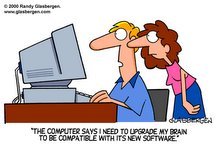Okay, this is not a complete list (and its not in any specific order)...I could actually never re-create a full list of all of the languages, hardware platforms, and operating systems I have worked on (there has just been too many) but its a near complete list other than a few assorted academic-purpose languages and a couple of completely obscure languages used just in bar-coding etc.
Programming languages that I have either been paid to write in or studied in school or elsewhere: Ada, Active Server Pages (ASP), Assembler (both for IBM mainframe and IBM pc), BASIC, C, C++, C#, Clipper, CLIPS, COBOL, Cold Fusion, DBase III+/IV, Delphi, DHTML, EXEC/EXEC II, Fortran, HTML, Java, JavaScript, JCL, LISP, Motorola's Four-Phase minicomputer language Vision, Paradox, Pascal, Perl, PL1, PL/SQL, Prolog, R:Base, Rexx, RPG II/III, Transact-SQL, VBScript, Visual Basic, XSLT
Of these, the languages with which I have the most experience (in order) are COBOL, 370 Assembler, all variants of SQL, Pascal, ASP, HTML, JavaScript, VBScript, C++, Java, and Cold Fusion
Most of the operating systems I have played with in no particular order are: VAX/VMS, Unix, Linux, Primos, IBM 360/65, IBM 370, Windows 2x, Windows 3x, Windows for Workgroups, Windows 95, Windows NT, Windows 98, Windows 2000, Windows XP, Tandy Deskmate, DOS, VM/CMS, MVS, Solaris, MS-DOS, CICS, DOS/VSE, AS/400, Novell Netware, and OSF/1
Today it appears that the winners of the language competition has been won by Java, C++/C#, and variants of XML with some scripting languages used as needed (i.e. JavaScript--now evolved somewhat into AJAX) and of course all supported by SQL. The three principal database platforms are Oracle, DB2, and SQL Server with lagging support for MySQL. And of course Microsoft rules the OS world (at least in my world it does).
What's interesting is not so much to see what was popular when--but why. For instance, Pascal was a superb language. It could easily have evolved into market dominance as it continued to evolve into more and more of a robust OO language. But Borland made some fatal marketing errors and Microsoft was a little less stupid even if it was strongly hated by the majority of those who called themselves "developers". True geeks still love all variants of Unix and those most true geeks are most enamored by anything that is labeled "open source". But business people are tired of bowing down to IT types and so superior products are frequently abandoned in favor of those products who were simply better marketed for business users.
I remember probably 15 years ago being told that software vendors were going to revolutionize the world so that software products would handle more of the detailed and repetitive "coding" aspects. As a "programmer" at the time, I found this appalling and insulting, of course. But that is exactly what is evolving in this area called BPM.
Of course, at least for the very foreseeable future, there will remain a need for folks who can program. Just like buyers ERPs learned they had to customize (ergo, I mean, code), companies that have jumped on the BPM bandwagon are finding they still need custom code (particularly integration code). This is actually a good thing for programmers. Instead of spending their time maintaining things such as user interfaces, they can attempt to resolve more complex problems. This is why my job is that of systems integrator. Although I will admit its a lot of fun to design user interfaces. ;-)
Thursday, April 12, 2007
Subscribe to:
Post Comments (Atom)



No comments:
Post a Comment